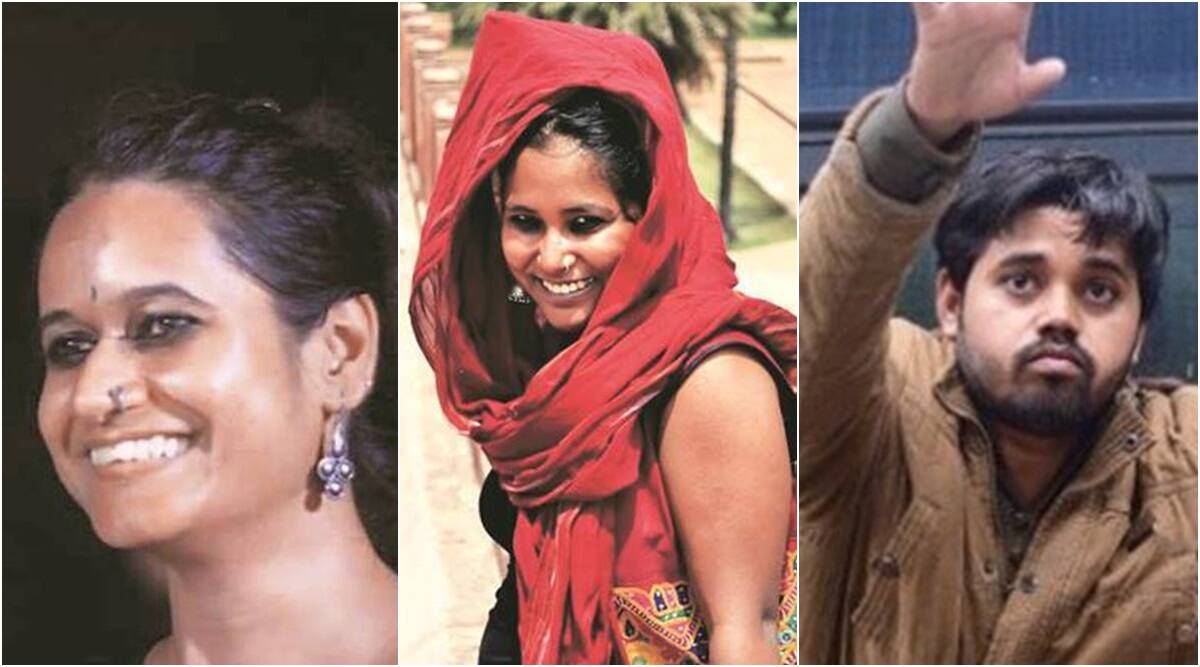Delhi Riots 2020: Supreme Court allows filing of 'Pen-drive' for taking voluminous chargesheet on record in plea challenging bail to accused

Supreme Court today, while allowing filing of pen drive by respondents, identified two issues for Court's consideration in Delhi Police's appeal against a High Court Order which granted bail to Asif Iqbal Tanha, Natasha Narwal and Devangana Kalita, accused under UAPA in Delhi Riots Case.
Court said that it shall examine the aspects related to;
1. Grant of Bail to the Accused(s) in Delhi Riots
2. Observations made by the Court therein.
A Division Bench of Justice SK Kaul and Justice Hemant Gupta, while briefly hearing the matter today, said,
“What is your grievance - grant of bail or observations?"
Solicitor General, Tushar Mehta and ASG Aman Lekhi responded that both, the order granting bail and the observations made therein, are subject matter of the present challenge.
Senior Advocate Kapil Sibal made a brief submission seeking time, filing pen drive as charge-sheet runs into 20000 pages.
Court recorded the submissions of the Counsel(s) appearing, while listing the same after 4 weeks.
Justice SK Kaul, while highligting the practice of arguing Bail matters at length before District Courts then High Courts followed by the Top Court, said,
"We don't propose to hear Couple of hours in a Bail Matter"
On June 18, The Top Court had issued notice in appeal filed by the Delhi Police against High Court Order granting bail to student activists Asif Iqbal Tanha, Natasha Narwal and Devangana Kalita, accused under UAPA in Delhi Riots Case.
Four weeks time was allowed to file counter affidavits.
Court had ordered that the impugned judgment by the Delhi High Court shall not bear a precedential value and may not be relied upon by any of the parties, in any proceedings.
It was clarified that release of the accused(s) on bail was not being interfered into, at this stage.
On July 16, In a hearing before a Delhi Court, Respondents pursued their application under Section 207 CrPC, seeking copy of Electronic records. It was the contention of the Learned SPP, Amit Prasad that the said “urgent application” was moved only to set up a defence before the Apex Court;
“The matter is already listed before the Supreme Court on July 20. Now in order to create a defence, this application is filed. The idea is to put the blame on this that because I was not provided these electronic records, I could not file my counter before the Supreme Court,” he submitted.
Arguments on Forum Shopping and no successive applications under Section 207 CrPC can be filed was further raised by Learned SPP, referring to a past application which was dismissed and a pending application before the Delhi High Court, which was listed a day prior.
Advocate Adit Pujari, for the defence, apprised the Court of the difference in applications filed before all Courts and added that the earlier application was rejected stating “Inappropriate stage – Application u/s 207 CrPC can be made only after Cognizance is taken.”
He further added that let the statement of Learned SPP be taken on record that no successive application u/s 207 CrPC can be filed and that the defence was approaching the Court with “unclean hands” making no better case than “forum shopping” for favourable orders.
Court observed, “the interpretation of Section 207 CrPC must be made considering the purpose for which it is enacted, in other words from accused’s stand point. Thus, it would not be correct for the prosecution to contend that successive applications under Section 207 CrPC cannot be moved.”
On the same day, Delhi High Court while hearing plea by Kalita and Narwal, on issues faced by Prison Inmates sought responses from prison authorities as to why people from abroad are denied access through Video Conference Facility, to prison inmates.
“You cannot give a bald statement, how does VC affect security,” asked Justice Rekha Palli to GNCTD, during the course of hearing.
On June 15, A Division Bench of Justice Siddharth Mridul & Justice Anup Jairam Bhambhani, while granting bail to the respondents, noted,
“We are constrained to say, that it appears, that in its anxiety to suppress dissent and in the morbid fear that matters may get out of hand, the State has blurred the line between the constitutionally guaranteed ‘right to protest’ and ‘terrorist activity’. If such blurring gains traction, democracy would be in peril.”
Case Title: State of NCT of Delhi v. Devangana Kalita | SLP (Crl.) No. 4289 of 2021
[photo credits: indian express]
